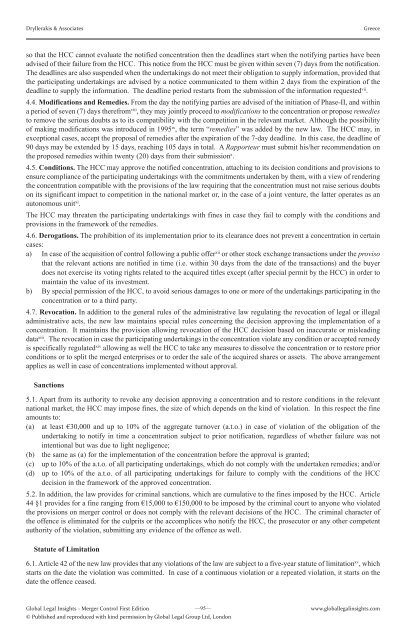Merger Controls First Edition - J Sagar Associates
Merger Controls First Edition - J Sagar Associates
Merger Controls First Edition - J Sagar Associates
Create successful ePaper yourself
Turn your PDF publications into a flip-book with our unique Google optimized e-Paper software.
Dryllerakis & <strong>Associates</strong> Greece<br />
so that the HCC cannot evaluate the notified concentration then the deadlines start when the notifying parties have been<br />
advised of their failure from the HCC. This notice from the HCC must be given within seven (7) days from the notification.<br />
The deadlines are also suspended when the undertakings do not meet their obligation to supply information, provided that<br />
the participating undertakings are advised by a notice communicated to them within 2 days from the expiration of the<br />
deadline to supply the information. The deadline period restarts from the submission of the information requestedvii .<br />
4.4. Modifications and Remedies. From the day the notifying parties are advised of the initiation of Phase-II, and within<br />
a period of seven (7) days therefromviii , they may jointly proceed to modifications to the concentration or propose remedies<br />
to remove the serious doubts as to its compatibility with the competition in the relevant market. Although the possibility<br />
of making modifications was introduced in 1995ix , the term “remedies” was added by the new law. The HCC may, in<br />
exceptional cases, accept the proposal of remedies after the expiration of the 7-day deadline. In this case, the deadline of<br />
90 days may be extended by 15 days, reaching 105 days in total. A Rapporteur must submit his/her recommendation on<br />
the proposed remedies within twenty (20) days from their submissionx .<br />
4.5. Conditions. The HCC may approve the notified concentration, attaching to its decision conditions and provisions to<br />
ensure compliance of the participating undertakings with the commitments undertaken by them, with a view of rendering<br />
the concentration compatible with the provisions of the law requiring that the concentration must not raise serious doubts<br />
on its significant impact to competition in the national market or, in the case of a joint venture, the latter operates as an<br />
autonomous unitxi .<br />
The HCC may threaten the participating undertakings with fines in case they fail to comply with the conditions and<br />
provisions in the framework of the remedies.<br />
4.6. Derogations. The prohibition of its implementation prior to its clearance does not prevent a concentration in certain<br />
cases:<br />
a) In case of the acquisition of control following a public offerxii or other stock exchange transactions under the proviso<br />
that the relevant actions are notified in time (i.e. within 30 days from the date of the transactions) and the buyer<br />
does not exercise its voting rights related to the acquired titles except (after special permit by the HCC) in order to<br />
maintain the value of its investment.<br />
b) By special permission of the HCC, to avoid serious damages to one or more of the undertakings participating in the<br />
concentration or to a third party.<br />
4.7. Revocation. In addition to the general rules of the administrative law regulating the revocation of legal or illegal<br />
administrative acts, the new law maintains special rules concerning the decision approving the implementation of a<br />
concentration. It maintains the provision allowing revocation of the HCC decision based on inaccurate or misleading<br />
dataxiii . The revocation in case the participating undertakings in the concentration violate any condition or accepted remedy<br />
is specifically regulatedxiv allowing as well the HCC to take any measures to dissolve the concentration or to restore prior<br />
conditions or to split the merged enterprises or to order the sale of the acquired shares or assets. The above arrangement<br />
applies as well in case of concentrations implemented without approval.<br />
Sanctions<br />
5.1. Apart from its authority to revoke any decision approving a concentration and to restore conditions in the relevant<br />
national market, the HCC may impose fines, the size of which depends on the kind of violation. In this respect the fine<br />
amounts to:<br />
(a) at least €30,000 and up to 10% of the aggregate turnover (a.t.o.) in case of violation of the obligation of the<br />
undertaking to notify in time a concentration subject to prior notification, regardless of whether failure was not<br />
intentional but was due to light negligence;<br />
(b) the same as (a) for the implementation of the concentration before the approval is granted;<br />
(c) up to 10% of the a.t.o. of all participating undertakings, which do not comply with the undertaken remedies; and/or<br />
(d) up to 10% of the a.t.o. of all participating undertakings for failure to comply with the conditions of the HCC<br />
decision in the framework of the approved concentration.<br />
5.2. In addition, the law provides for criminal sanctions, which are cumulative to the fines imposed by the HCC. Article<br />
44 §1 provides for a fine ranging from €15,000 to €150,000 to be imposed by the criminal court to anyone who violated<br />
the provisions on merger control or does not comply with the relevant decisions of the HCC. The criminal character of<br />
the offence is eliminated for the culprits or the accomplices who notify the HCC, the prosecutor or any other competent<br />
authority of the violation, submitting any evidence of the offence as well.<br />
Statute of Limitation<br />
6.1. Article 42 of the new law provides that any violations of the law are subject to a five-year statute of limitationxv , which<br />
starts on the date the violation was committed. In case of a continuous violation or a repeated violation, it starts on the<br />
date the offence ceased.<br />
Global Legal Insights <strong>Merger</strong> Control <strong>First</strong> <strong>Edition</strong><br />
—95—<br />
© Published and reproduced with kind permission by Global Legal Group Ltd, London<br />
www.globallegalinsights.com


